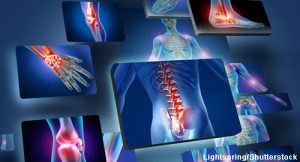 ACR CONVERGENCE 2020—Likening the development of rheumatoid arthritis (RA) to water under the surface of an iceberg, in which what lies beneath is hidden from view, Ronald van Vollenhoven, MD, PhD, chair of the Department of Rheumatology and Clinical Immunology at the Amsterdam University Medical Centers of the University of Amsterdam, The Netherlands, provided an apt visual for a discussion on the etiology of RA and potential treatments to slow, stop or reverse the pathogenesis of preclinical RA before it manifests itself in its more debilitating, active disease form. Presented during the session Resetting Immune Tolerance for the Prevention of RA, Dr. van Vollenhoven joined two other experts to discuss the current evidence on potential pathogenic mechanisms underlying preclinical RA autoimmunity and subsequent active disease.
ACR CONVERGENCE 2020—Likening the development of rheumatoid arthritis (RA) to water under the surface of an iceberg, in which what lies beneath is hidden from view, Ronald van Vollenhoven, MD, PhD, chair of the Department of Rheumatology and Clinical Immunology at the Amsterdam University Medical Centers of the University of Amsterdam, The Netherlands, provided an apt visual for a discussion on the etiology of RA and potential treatments to slow, stop or reverse the pathogenesis of preclinical RA before it manifests itself in its more debilitating, active disease form. Presented during the session Resetting Immune Tolerance for the Prevention of RA, Dr. van Vollenhoven joined two other experts to discuss the current evidence on potential pathogenic mechanisms underlying preclinical RA autoimmunity and subsequent active disease.
“There is a great movement in trying to prevent RA by targeted interventions in the preclinical stage,” said Dr. van Vollenhoven, who also is the director of the Amsterdam Rheumatology Center.
B Cell Depletion: Targeted Therapy?
Dr. van Vollenhoven reviewed research over the past decades that has established the role of anti-citrullinated peptide antibodies (ACPAs) and B cells in the development of preclinical RA autoimmunity. This research, he said, has provided a sound rationale for targeting B cells in the preclinical phase.
He then reviewed clinical results of the PRAIRI trial by Gerlag et al. that looked at whether B cell-directed therapy (or B cell depletion) using a single infusion of 1,000 mg rituximab could prevent RA in at-risk individuals.1 The biologic was not found to prevent RA in the high-risk cohort, but it did delay the onset of disease. Dr. van Vollenhoven suggested the results warrant further inquiry as to understand better why the therapy was not preventive, such as was the treatment not introduced early enough or was the single dose used not sufficiently strong enough?
Dr. van Vollenhoven underscored the importance going forward to improve prediction of which patients are at highest risk of developing RA to justify a treatment trial with bigger results. “The key challenges are identifying the patient who is at high risk and selecting optimal treatment,” he said.
Potential Pathogenic Mechanisms of Preclinical RA
V. Michael Holers, MD, Scoville Professor and head of the Division of Rheumatology at the University of Colorado School of Medicine, Denver, discussed ongoing work through the Studies of the Etiology of Rheumatoid Arthritis (SERA) program at the University of Colorado, examining the factors driving the initiation and development of seropositive RA. He highlighted evidence from multiple independent studies supporting a mucosal site of origin of preclinical RA autoimmunity in at-risk people—sites include the periodontium, intestine, cervicovagina, peripheral blood and lungs.2
When looking at the potential of the lung as an initiating site, for example, Dr. Holers noted that evidence shows airway abnormalities are more common in RA-related autoantibody positive at-risk people compared with controls. Immunoglobuli G (IgG) and IgA anti-cyclic citrullinated peptide 3 antibodies are differentially produced in the lung in people at risk of RA, as well as in classified patients, and sputum ACPA elevations are linked to neutrophil extracellular trap remnants in at-risk persons.3,4
Dr. Holers and his group are also looking at a number of mechanism-based approaches to interventions, such as the epigenetics of blood cells in at-risk populations for potential therapeutic pathways, multidimensional T cell analytic approaches, and others.
Co-Stimulation Blockade
Peter C. Taylor, MA, PhD, Norman Collisson Professor of Musculoskeletal Sciences and head of clinical sciences at the Botnar Research Centre in the Nuffield Department of Orthopedics, Rheumatology and Musculoskeletal Sciences at the University of Oxford, England, also reviewed observations on the mucosal origin of RA that have led to a hypothesis of the interaction of genes and the environment in preclinical development of RA.
He discussed evidence showing how CD4+ T cells are directly implicated in the pathogenesis of RA, as well as evidence showing that patients with joint pain and positive for ACPAs and rheumatoid factor (RF) are at risk of developing persistent arthritis.5,6 “In observational studies, about 40% of patients who have arthralgias and positive ACPA may go on to develop classification criteria for rheumatoid arthritis,” Dr. Taylor said.
This observation, he said, has generated the hypothesis that co-stimulation blockade in these persons may slow or even prevent the evolution of classification criteria positive RA. Two clinical trials are currently underway testing this hypothesis.
Future Directions
Where will all this research lead? Dr. Holers emphasized that “like cardiovascular disease is now, seropositive RA will become a disease in which prevention, early treatment and management of established disease will all be part of the rheumatologist’s care approaches.”
Mary Beth Nierengarten is a freelance medical journalist based in Minneapolis.
References
- Gerlag DM, Safy M, Maijer KI, et al. Effects of B-cell directed therapy on the preclinical stage of rheumatoid arthritis: The PRAIRI study. Ann Rheum Dis. 2019 Feb;78(2):179–185.
- Holers VM, Demoruelle MK, Kuhn KA, et al. Rheumatoid arthritis and the mucosal origins hypothesis: External protection becomes internal destruction. Nat Rev Rheumatol. 2018 Sep;14(9):542–557.
- Demoruelle MK, Weisman MH, Simonian PL, et al. Airways abnormalities and rheumatoid arthritis-related autoantibiodies in subjects without arthritis: Early injury or initiating site of autoimmunity. Arthritis Rheum. 2012 Jun;64(6);1756–1761.
- Demoruelle MK, Harrall KK, Ho L, et al. Anti-citrullinated protein antibodies are associated with neutrophil extracellular traps in the sputum in relatives of rheumatoid arthritis patients. Arthritis Rheumatol. 2017 Jun;69(6):1165–1175.
- Chemin K, Gerstner C, Malmstrom V. Effector functions of CD4+ T cells at the site of local autoimmune inflammation—Lessons from rheumatoid arthritis. Front Immunol. 2019 Mar;10:353.
- Bos WH, Wolbink GJ, Boers M, et al. Arthritis development in patients with arthralgia is strongly associated with anti-citrullinated protein antibody status: A prospective cohort study. Ann Rheum Dis. 2010 Mar;69(3):490–494.






